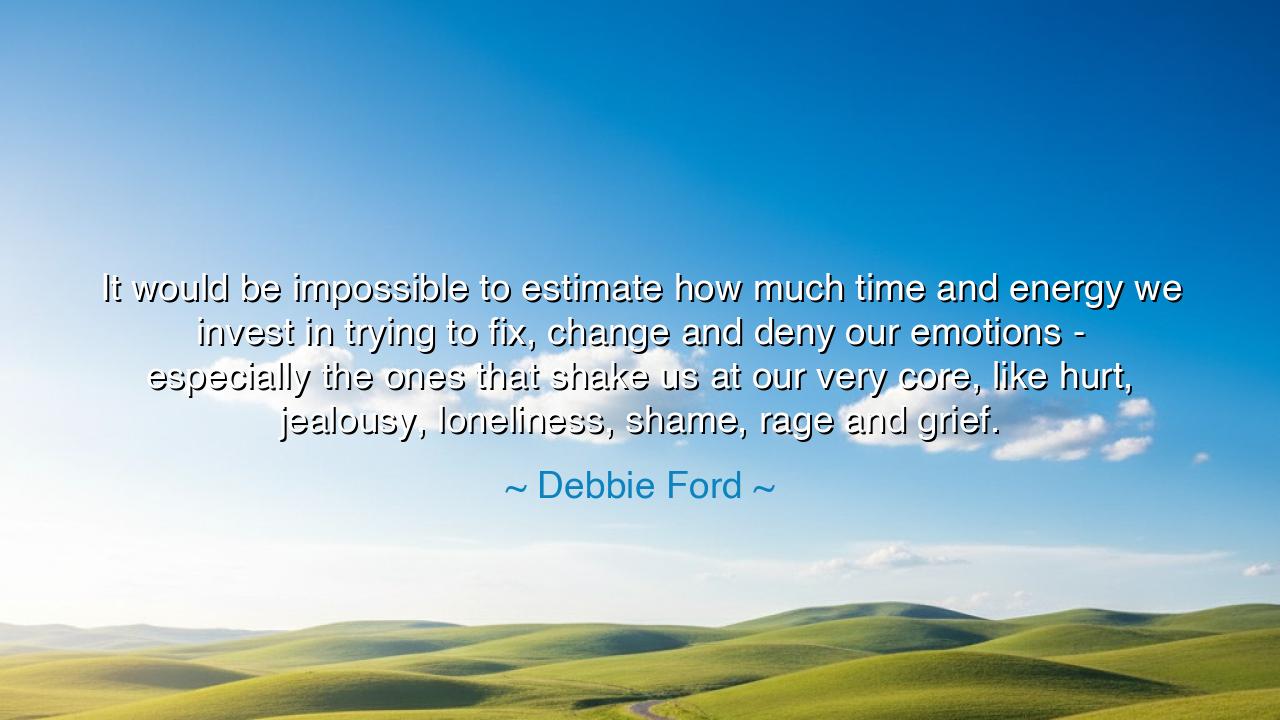
It would be impossible to estimate how much time and energy we
It would be impossible to estimate how much time and energy we invest in trying to fix, change and deny our emotions - especially the ones that shake us at our very core, like hurt, jealousy, loneliness, shame, rage and grief.






"It would be impossible to estimate how much time and energy we invest in trying to fix, change and deny our emotions—especially the ones that shake us at our very core, like hurt, jealousy, loneliness, shame, rage and grief." With these words, Debbie Ford, the teacher of the inner life, speaks to one of the deepest truths of the human condition. She unveils a quiet tragedy that afflicts all people—the endless struggle to hide from our own hearts. In her voice, there is neither condemnation nor pity, but a plea for understanding: that our suffering is not born from emotion itself, but from our refusal to feel it. Her wisdom reminds us that to heal is not to flee from pain, but to embrace it with courage and compassion.
Debbie Ford, who lived as both a student and guide of emotional healing, drew this insight from her own years of darkness. Known for her teachings on the shadow self, she believed that within every human being there are parts we try to bury—the feelings and memories that we fear will make us unlovable or weak. Her quote arises from this understanding: that much of our energy is spent not in living, but in resisting life’s natural tides of feeling. We build walls of denial to protect ourselves from hurt, yet in doing so, we trap ourselves within those very walls. To spend one’s days suppressing sorrow or jealousy is to fight against the ocean with a single hand—it is exhaustion disguised as control.
The emotions she names—hurt, jealousy, loneliness, shame, rage, and grief—are not intruders, but ancient companions of the soul. They are the teachers no one seeks, yet all must meet. In the world of the ancients, philosophers understood emotion not as weakness but as fire—dangerous, yes, but also the source of transformation. To deny it was to deny life itself. In the myths of Greece, even the gods themselves wept, loved, envied, and raged. Their stories were not written to glorify perfection, but to remind mankind that divinity, too, resides in emotion’s storm. Debbie Ford’s wisdom stands in this lineage: she calls us to remember that our emotions are not curses, but messages from the soul longing to be heard.
History itself bears witness to this truth. Abraham Lincoln, the great emancipator, was haunted all his life by melancholy—a shadow he never fully escaped. Yet it was through his grief and sorrow that he grew into wisdom and compassion, guiding a nation through its darkest hour. His pain did not destroy him; it refined him. In him, as in Ford’s teaching, we see that the attempt to deny emotion is futile—but the willingness to accept and transform it is the mark of greatness. The man who dares to face his despair becomes a light for others still lost in theirs.
Ford’s words also expose a profound paradox: in our effort to avoid suffering, we multiply it. When we deny our emotions, they do not disappear—they retreat into the depths, where they fester and rule us from the shadows. The anger we suppress becomes bitterness; the shame we hide becomes isolation; the grief we reject becomes numbness. Modern man, in his pursuit of productivity and control, often lives far from his own heart. We fix and medicate what we should listen to. We fear breaking down, not realizing that breaking down is often the beginning of rebirth. True peace does not come from suppressing the storm, but from learning to stand within it without fear.
The ancients would have said: “Know thyself.” Ford’s wisdom is an echo of that eternal command. To know oneself fully, one must not only know joy and virtue, but also pain and imperfection. The heart must be open to both light and shadow. When a man accepts his rage, he learns discipline; when he accepts his grief, he learns empathy; when he accepts his shame, he learns humility. Every emotion, however fierce, is a teacher sent by life itself. To deny them is to refuse the lessons of the soul, but to embrace them is to awaken into wisdom.
So, let this teaching be carried forward like a sacred torch: Do not flee from your emotions. Sit with them. Name them. Honor them. When you feel jealousy, look deeper and see your longing to be valued. When you feel grief, recognize your love for what was lost. When you feel rage, see the wound that cries for justice. Each feeling, if faced with compassion, leads you home to your truest self. As Debbie Ford reminds us, healing begins not when the pain disappears, but when we stop denying it. For only when we face what shakes us at our core can we discover the stillness that lies beyond—the eternal peace that no storm can touch.






AAdministratorAdministrator
Welcome, honored guests. Please leave a comment, we will respond soon